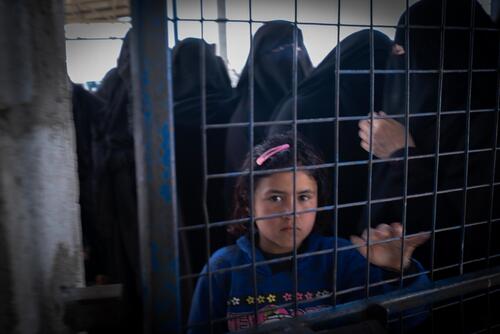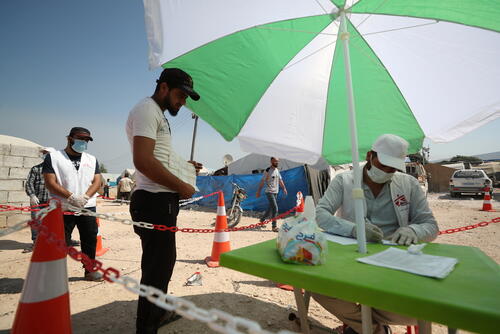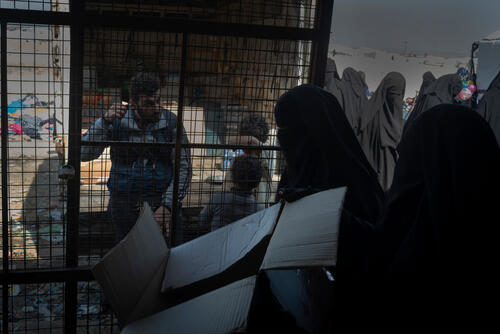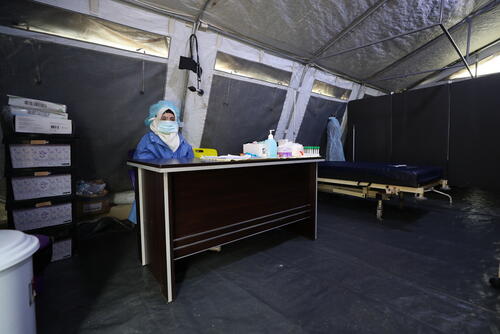- As the first death from COVID-19 is reported in northeast Syria, MSF is increasingly concerned the region is woefully ill-prepared to handle the pandemic.
- Amidst nine years of war, the healthcare system is broken, with limited supplies, few medical staff and health facilities that have closed or no longer functioning.
- MSF teams are responding in Al-Hassakeh hospital and in Al-Hol camp, with training and preparation of hospitals, and have staff and supplies ready to be sent to northeast Syria.
- MSF urges authorities in Iraqi Kurdistan and northeast Syria to allow timely access of international staff and supplies into northeast Syria.
AMSTERDAM/NORTHEAST SYRIA — As the first reported death from COVID-19 is confirmed in northeast Syria, Médecins Sans Frontières (MSF) is concerned about the region’s preparedness and capacity to respond to an outbreak. A weakened health system, delays in testing and border closures make it near-impossible to adequately respond to a COVID -19 outbreak in the region.
Nine years of conflict and military operations in northeast Syria have left the region with a broken health system. Many health facilities can no longer function and those that remain open were already struggling to respond to the existing medical needs before the COVID-19 pandemic.
With the harsh reality of limited supplies and scarce medical staff, several health services and facilities have been forced to close, leaving patients with chronic diseases and compromised immune systems even more vulnerable during the pandemic. MSF believes that the few functional medical facilities in the region could very quickly become overwhelmed with an influx of COVID-19 patients, leaving many people will be at risk.
The response in northeast Syria at this time is not nearly enough. A significant increase in assistance from health and humanitarian organisations, and donors are essential.Crystal van Leeuwen, MSF Medical Emergency Manager for Syria
MSF is working in collaboration with local health authorities and other organisations in northeast Syria to prepare for an increase in patients infected with COVID-19 in the region. We will concentrate our efforts at Al-Hassakeh National hospital and Al-Hol camp.
“We are deeply concerned about the lack of laboratory testing, the absence of contact tracing, inadequate hospital capacity to manage patients and limited availability of personal protection equipment,” says Crystal van Leeuwen, MSF Medical Emergency Manager for Syria. “The response in northeast Syria at this time is not nearly enough. A significant increase in assistance from health and humanitarian organisations, and donors are essential.”
We are particularly concerned about the conditions in camps across the region where people are living in cramped, congested spaces, with little or no access to medical services or clean water. In Al-Hol camp, where MSF started providing medical and humanitarian assistance in January 2019, the overcrowded camp now houses around 65,000 people, none of whom are allowed to leave. Ninety-four per cent of them are women and children.
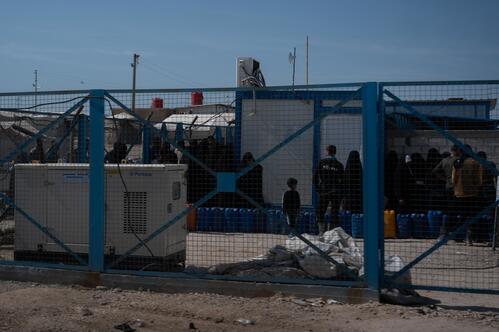
According to local health authorities in northeast Syria, there has been one patient with COVID-19 confirmed in the region, although the sharing of the test results was delayed by two weeks. By the time the results were received, the patient had passed away. Currently, the only testing capacity available for the northeast region is through the Central Reference Laboratory in Damascus and challenges exist in getting patients suspected of having COVID-19 tested and receiving timely feedback on results.
“The lack of reliable and timely testing capacity in the region makes it nearly impossible to detect cases at an early stage, significantly hindering the ability to slow transmission within communities early on, when it is most important,” adds van Leeuwen.
Significant challenges exist in ensuring that supplies and humanitarian personnel can enter northeast Syria through northwest Iraq.
We respect the COVID-19 measures put in place by the authorities in Iraqi Kurdistan; however, exemptions and facilitation for supplies must be granted to humanitarian workers...Will Turner, MSF Emergency Manager
“We respect the COVID-19 measures put in place by the authorities in Iraqi Kurdistan; however, exemptions and facilitation for supplies must be granted to humanitarian workers to ensure that appropriate levels of support reach northeast Syria,” says Will Turner, MSF Emergency Manager. “Much of the humanitarian support to northeast Syria is reliant on passing through Iraqi Kurdistan.”
“We have much-needed additional supplies and medical staff ready to travel, but we lack the guarantees that they can enter Iraqi Kurdistan and move on into northeast Syria,” says Turner. “In addition, MSF respects a 14-day quarantine measure for our staff entering the Iraqi Kurdistan region.”
MSF stands ready to support a COVID-19 response in northern Syria and Iraq; however, our response remains limited as long as timely access is not granted. MSF urges authorities in Iraqi Kurdistan and northeast Syria to facilitate timely access for humanitarian organisations, including for humanitarian cargo and international staff to travel to and enter into both countries.
Across northeast Syria, MSF is participating in the COVID-19 humanitarian taskforce, chaired by the local health authorities. At the Al-Hassekeh National Hospital, MSF is training staff and preparing the facility for the arrival of COVID-19. This includes creating a 48-bed isolation ward, introducing surveillance measures, case identification and management, and patient flow and triage processes, along with infection prevention and control (IPC) and personal protective equipment (PPE) usage training (to prevent over-use). MSF is also providing logistical support for preparedness of facilities for receiving patients (e.g. rehabilitating wards).
MSF is continuing its regular activities and support to Raqqa National hospital, Raqqa outpatient department clinic and Kobane Maternity Hospital, although the lack of supply and access for staff to enter the country is significantly hindering these responses.
In Al-Hol camp, we continue to run an inpatient nutrition centre and a tent-based wound care programme for those who cannot reach the clinics, while also providing water and sanitation support in the camp. We have also started mapping vulnerable people who are more likely to develop severe illnesses as a result of COVID-19 and are sharing targeted health awareness messages and hygiene kits accordingly. We are preparing to transfer the inpatient therapeutic feeding centre (ITFC) for case management, if the needs for additional case management capacity is required in the camp.
In Al-Hassakeh, and when there are water supply cuts in the region, MSF provides water trucking to the most vulnerable communities in Al-Hassakeh.
In northwest Syria, since the beginning of the COVID-19 pandemic, we have been reviewing the triage systems and patient flow in the hospitals and health centres that we support in Idlib governorate to ensure fast detection of potential COVID-19 patients. This measure is taken to put symptomatic patients under observation until an ambulance arrives to take them to a dedicated facility for tests and follow-up. We have also set-up Hygiene Committees and reinforced them with additional staff.
In the camps, we have adapted the triage system of our mobile clinics to protect the patients and the medical staff and we have implemented social distancing measures during NFI distributions. We are also spreading awareness and health promotion messages about the means of prevention and how to react in case of symptoms.
To ensure independence from political pressures, MSF receives no government funding for its work in Syria.



